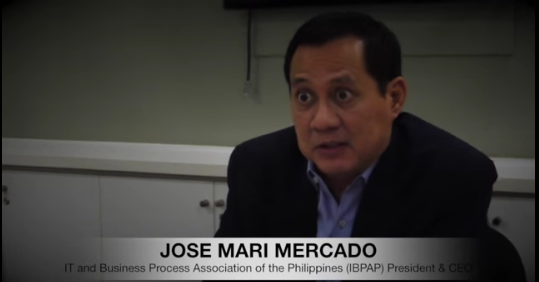Growing faster than China, PH BPOs look ahead
The Business Process Outsourcing (BPO) sector remains one of the fastest growing industries in the Philippines over the past decade with over a million in the workforce at the end of 2014.
“We close 2014 with 1.03 million people working for this industry and we generated $18.9 billion for the Philippine economy,” says Jose Mari Mercado, president and CEO of the IT and Business Process Association of the Philippines (IBPAP).
The BPO industry in the Philippines “has been very successful,” posting an annual growth rate of 15-18 percent. (As a point of comparison, the fastest growing economy in the world in the last 30 years, China, grew by an average rate of slightly over 10 percent.)
And given the country’s pool of talents and resources that fit the requirement of the call center business, the industry’s prospects are glowing. “It’s very bright,” Mercado says.
“The type of the work that is involved requires good English language skills, good customer service orientation, and college graduates who can converse and deal with customer problems.” These requirements, he says, fit the Filipino personality very well.
In 2010, the Philippines overtook India as the global leader in the contact center space.
In 2012, the BPO industry in the country accounted for 5.6 percent of the country’s gross domestic product. Mercado says this could rise to 7.8 percent by 2016 under a “road map” prepared in coordination with the government.
More companies continue to invest in the call center business in the Philippines because of the low costs and the high quality of the English-speaking workforce. And “we’re becoming more deliberate and conscious about matching the competencies with the position,” he says.
Even better
One of the biggest advantages of the Philippines is the reasonable cost of doing business in the country. “We are cheaper, which make us a very competitive country when it comes to cost,” he says.
But despite the low costs, the quality of service is at “par or even better” compared to that of other countries.
“Our clients have discovered that not only would they be able to save on cost when they come to the Philippines but the quality is actually at par or even better than their previous experience,” he says. “They are getting both benefits from the same location.”
On the employee side, however, the industry remains a lucrative career option. “It pays very well. It is definitely above industry standards,” Mercado says.
The sector is also fundamentally meritocratic. Promotion, he says, is based entirely on merit. “This is the industry where everything is based on merit … It is an industry that is ‘color-blind.’ We do not look at your sex, sexual preference, your religion, your physical deformity, we just look at your competence and how you perform against the standards.”
In a highly competitive environment, BPOs also make sure to look after their employees. “We go out of our way to make sure that we take care of the employees,” he says.
In the Philippines, call centers are equipped with gymnasiums, sleeping quarters, clinics.
Government partner
Private-public sector partnership is another key to the success of the BPO industry in the country.
IBPAP is collaborating with government agencies and also the academe to ensure that the competencies of new graduates meet the requirements of the industry.
“We work closely with the academe to make sure that the competencies or the skills of our graduates are aligned with the competencies our industry needs so that when they come of the academe we are ready to absorb them because they are qualified,” Mercado says.
He notes that the IBPAP and the government have launched the Next Wave City program, which aims to educate the private sector, the local government and the academe on BPO opportunities and advise them on how they can make cities BPO-ready for investors.
“As a result, today, 30 percent of our work is being done outside Metro Manila,” he says. Cities like Cebu, Baguio, Bacolod, Iloilo and Davao are now home to hundreds of thousands of call center agents. In round sums: Cebu has 100,000 call center agents; Bacolod has 25,000; Iloilo, Clark and Baguio have 15,000.
“It’s good that we’re spreading the work across the country,” he says.
Infrastructure in these cities, he says, has improved to the point that it can support the 24/7 life cycle on which the call center industry runs.
The future
The 2016 elections are not a factor. Mercado says the IBPAP was “not concerned with the change of leadership.”
“I believe that we will continue to get the support of the government,” he says. “I don’t think anybody who will take over in the next administration will ignore our industry.”
“I believe that if we continue to do what we are doing, which is understanding what the market requires and preparing our industry to meet those market requirements, we will continue to be successful,” Mercado says. He then quotes a Bangko Sentral ng Pilipinas (BSP) estimate.
“BSP said that if our growth continues at its current rate and the growth rate of the OFW remittances continue to grow at its own rate, we will actually overtake the OFW remittances by 2017,” he says. And the truly wonderful thing? Call center agents contributing to the economy’s stability “did not have to leave home” to find meaningful work.
“They are with their families and that’s what we are proud of.”















